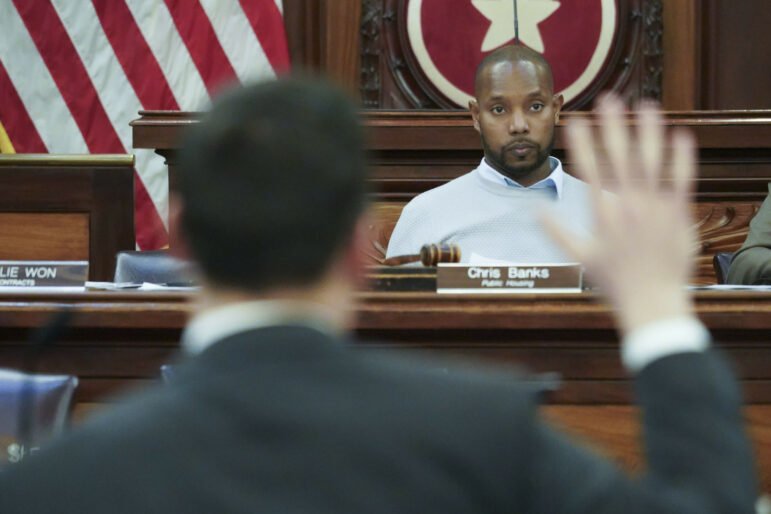
lindseyboylan.com/herzog2020.com
Lindsey Boylan and Jonathan Herzog, candidates for Congress.In the 28 years since he was selected to take the place of a candidate who died the day before the Democratic primary, Rep. Jerrold Nadler has faced little resistance to returning to Washington every other January.
There was a primary in 1994 that he won with two thirds of the vote, and another two years later where 83 percent of voters backed Nadler. In a district where winning the Democratic primary is tantamount to election, Nadler didn’t face another intra-party challenge until 2016; that year, nine out of ten votes went his way. No one bothered contesting the nomination in 2018, allowing Nadler to return unobstructed to Washington, where he played a lead role in the impeachment drama.
This year, three Democrats are on the ballot for the June 23 primary in the 10th district, which covers most of the West Side of Manhattan, a sliver of Brooklyn’s shoreline and a chunk of Bensonhurst, Borough Park and Kensington.
Lindsey Boylan, a former Deputy Secretary of Economic Development under Governor Cuomo, has more financial resources–$147,000 on hand at last count, compared with the incumbent’s $957,000. Jonathan Herzog has substantially less money on hand, but is hoping to tap into the energetic support enjoyed by former presidential candidate Andrew Yang, for whom Herzog worked.
Both appeared on the WBAI Max & Murphy Show on Wednesday.
Lindsey Boylan, Democrat for Congress
Jonathan Herzog, Democrat for Congress
The two challengers emphasize different policies: Herzog focuses on civil rights, issues around data, electoral reform and the universal basic income. Boylan talks about climate change, housing and immigration. Their critiques of Nadler (who declined an invitation to debate the two) are essentially the same—that time has passed him by, and that he hasn’t accomplished enough in 28 years in office to justify letting him have 30.
Whether the criticism is fair or not—Nadler’s allies would say that his value as a consistent progressive voice cannot be measured merely in the number of bills he passed. On June 23, or more accurately on whatever day the mail-in ballots get counted, Nadler and his rivals will figure out if it sticks.
With reporting by Ben Max and Anika Chowdhury









7 thoughts on “Challengers Make their Case Against Nadler”
Just listened to the Lindsey Boylan interview and about to listen to Mr. Herzog but wow – what a missed opportunity. Boylan’s style of leadership? Such a soft pitch. How about actual issues that effect New Yorkers? Rent? Employment? Healthcare? These are practical issues. Boylan supports Medicare for All – can she speak on that more? She was inspired by Clinton and worked for Cuomo, but she’s walking with protesters now — what’s her position on de Blasio and Cuomo’s approach to the protests? Policing, prison, and justice reform? What are her substantive proposals for this stuff? Her husband manages an investment bank. What’s her position on the role of money and the financial world in elections generally and the Democratic Party specifically? Election reform? I hope the Jonathan Herzog interview is more substantial.
Why is a person whose spouse manages an investment bank to be seen as being a model progressive?
Nadler has seniority in an institution where seniority counts. Nadler has contacts and the respect of key people in government. (Just go back and view clips of the impeachment hearings, and view the body language of the principles and you will see something of his relationship to influential people.) Nadler knows his way around DC, and New York City needs that. Nadler is, essentially, a person with integrity. He is smart, caring, concerned.
There is great value in bringing younger people into the Congress. But that changes not at all the great value of experience, of having sustained the battle over the course of decades, of persisting in the face of an opposition that holds some views antithetical to those of most New Yorkers, of having access to the leaders of the Democratic Party.
We hope that by December the country will be on its way with a Democratic president, a Democratic House, and a Democratic Senate. Why pass up the opportunity to have a representative whose voice will be heard, whose insights will count, and who knows well what his constituents care about?
[Disclosure: The writer went to high school and college with Representative Nadler, but has not seen or spoken with him since middle of college.]
I listened to the Boylan interview, and she did not give a single substantive answer about what she would do differently than Nadler if elected. She stated that she is an introvert and gets nervous before interviews…well why on earth is she running for Congress??? Like it or not, Congress is a stage, and if you are not comfortable being on stage, it is not the right place for you.
My other significant concern about Boylan is she seems to be willing to attack anyone on twitter, including essentially every elected Democrat in NYC, NY State, and DC. Now is not the time for division in our party (I’m a Democrat). There is simply too much at stake. Finally, Ms. Boylan’s spouse is a major banker, and while that is not relevant on a personal level, if she is going to represent us in Congress then voters should know how investment banking is going to mix with her policy.
Having had awful first-hand experience with Nadler’s district office staff as a constituent and federal worker dealing with serious violations by a federal agency, I can tell you that Nadler–as evidenced by his district director–does not give a hoot about his constituents or major federal policy issues. I was referred to Nadler’s office by a staffer of another member of Congress whom I knew personally, and thus had consulted her rather than Nadler’s staff first. She was troubled by the indifference and outright rudeness I faced when I went to Nadler’s staff, because he’s officially my “representative”–on paper only. Needless to say, thanks in part to Nadler’s (staff) indifference to the matter encountered by his constituent at a federal agency, a Trump-appointee-dominated regulatory body may soon issue a ruling that significantly curtails workers’ rights Nationwide.
Nadler talks a lot but has very little to show by way of results–not merely in legislation or funding for NYC, but his indifference to his constituents. This is what happens when you hold power for so long that you lose sight of who gave you that power and why you have it.
Lindsey Boylan has significant experience working on progressive advocacy issues and thus I trust her more than Nadler at this point to be more effectual than Nadler, much like AOC has proved to be. It’s time for change, and for a member of Congress who’s actually responsive to constituents.
Jerry Nadler is someone who makes it a point to listen to his constituents through town hall meetings, as well as zoom meetings over the internet during the Covid crisis. While he knows the pulse of Washington, he is fighter for the people in his district. I don’t know why another poster said the things she did, but when my family has contacted his office they were helpful, navigating us through a difficult issue. He has the courage to speak out for important issues, such as health care, climate change and against corruption. In this election, he has my vote.
I haven’t read or seen the interview but watch some of the debate on NY1.
Herzog is a well-meaning nerd. Boylan is an embarrassment.
While Nadler sat and respectively listened as he answered questions, Herzog was quiet and respectful. Boylan though would smirk and gesture to distract the speaker. All the time, I thought, trying to upset whoever was talking. Did she know she was “on camera” with a “alive mic”?
She was doing herself no good.
What I want to know is, if I want a change from Jerry Nadler, which of the challengers should I choose? They both talk about him, but I’m already sold on wanting someone better; I want to hear them make their cases againt each other. It’s a three-way race; which has the better chance to unseat him?